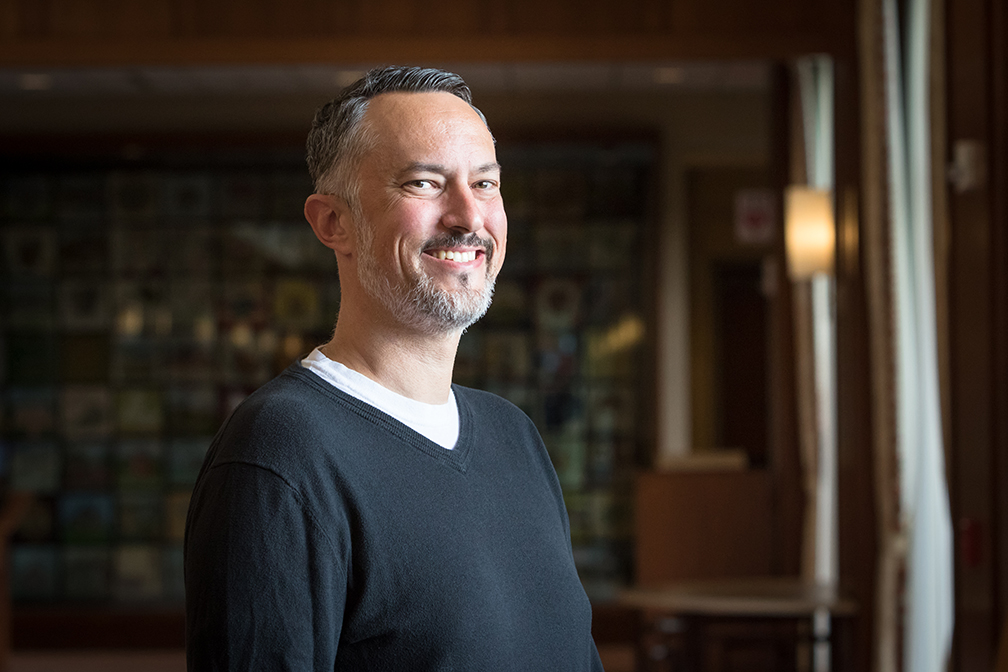Department of Religion and Culture Welcomes Matthew Gabriele as Chair
September 20, 2018

How can engineers work better in cultures that differ from their own? Are religions now the same as they’ve been throughout history? What does it mean to be Appalachian? These are just a few of the many questions the Virginia Tech Department of Religion and Cultureexplores.
“We’re a department that considers the questions that people take for granted,” said Matthew Gabriele, a professor who is now defining his new role as department chair. “We re-ask questions about concepts we may think we understand, but haven’t really interrogated.”
A member of the Virginia Tech community since 2006, Gabriele is well known for his courses centered on popular-culture phenomena such as the television series “Game of Thrones” and the video game “Dragon Age.” His research and teaching explore other topics as well, such as religion, violence, and apocalypse, whether based in the Middle Ages or the modern world.
“Matt’s wide-ranging academic interests are a definite strength for a department that takes such a holistic approach to issues facing humanity,” said Rosemary Blieszner, dean of the College of Liberal Arts and Human Sciences. “His rapport with students is evident, and his natural leadership abilities make him an effective advocate for faculty members as well.”
Gabriele is the author of “An Empire of Memory: The Legend of Charlemagne, the Franks, and Jerusalem before the First Crusade,” published by Oxford University Press. For this work, the Southeastern Medieval Association awarded him Best First Book in 2013.
For the same publisher, he is preparing his latest manuscript, “Prophecy, Apocalypse, and the Intellectual Transformation of the Medieval West.” Adding to his credentials, he has co-edited several books, writes for many journals, and serves as a contributing columnist for Forbes.
While at Virginia Tech, Gabriele has received numerous honors, including, most recently from the College of Liberal Arts and Human Sciences, the 2017 Jerome Niles Faculty Research Award, which he also accepted in 2010. He has received accolades in areas as varied as teaching excellence, global partnership sustainability, and departmental diversity. Other honors include an inaugural membership in the Academy of Faculty Leadership.
From 2014 to 2017, Gabriele served as the faculty principal for the university’s Residential College at West Ambler Johnston. He said his administrative experience there helped prepare him for chair of the Department of Religion and Culture.
“The core mission there was about working with students,” he said. “That’s what I really enjoy: talking to them and helping them define their career goals.”
In addition, he used that position to support other faculty members’ successes, which he looks forward to pursuing in his new role.
“We’re a small department, but we do interesting, awesome stuff,” he said. “I want to help the faculty and students do more of that. It can be research, teaching, or outreach through the spirit of a land-grant university and Ut Prosim.”
Ut Prosim, the university’s motto, translates to “That I May Serve.”
Gabriele has also been a visiting researcher in religion and politics at the Westfälische Wilhelms-Universität Münster and, prior to joining the faculty at Virginia Tech, a lecturer at the University of California, Berkeley. He received his master’s and doctoral degrees from the University of California, Berkeley, and his bachelor’s degree from the University of Delaware.
Gabriele’s department at Virginia Tech offers an undergraduate degree in religion and culture and, in collaboration with the School of Visual Arts, an interdisciplinary master’s degree in material culture and public humanities. He looks forward to working with students in both programs.
“These degrees delve into all the questions we explore in the department,” Gabriele said. “How, for example, do we engage globally as intellectuals? And how do we make meaning out of our findings?”
Written by Leslie King and photographed by Richard Allnutt







